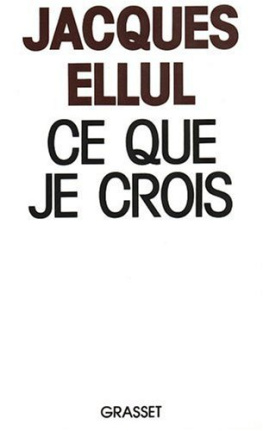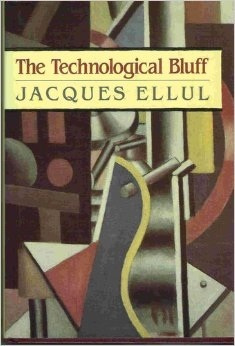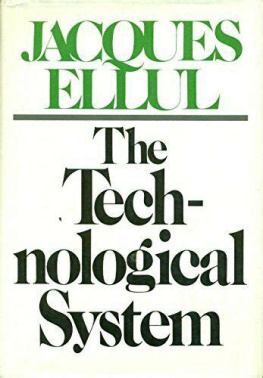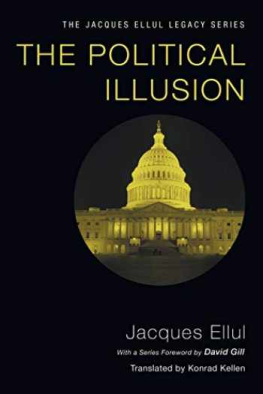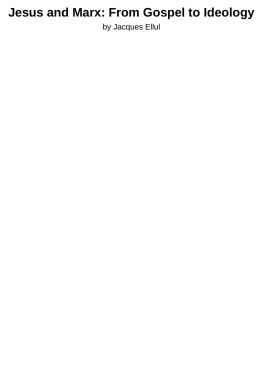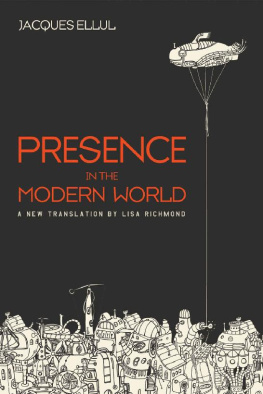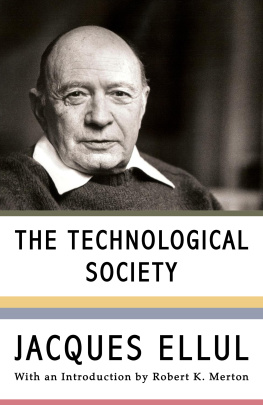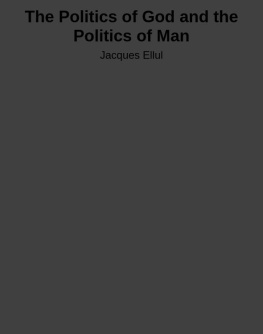Jacques Ellul - What I believe
Here you can read online Jacques Ellul - What I believe full text of the book (entire story) in english for free. Download pdf and epub, get meaning, cover and reviews about this ebook. year: 1989, publisher: Eerdmans, genre: Religion. Description of the work, (preface) as well as reviews are available. Best literature library LitArk.com created for fans of good reading and offers a wide selection of genres:
Romance novel
Science fiction
Adventure
Detective
Science
History
Home and family
Prose
Art
Politics
Computer
Non-fiction
Religion
Business
Children
Humor
Choose a favorite category and find really read worthwhile books. Enjoy immersion in the world of imagination, feel the emotions of the characters or learn something new for yourself, make an fascinating discovery.
- Book:What I believe
- Author:
- Publisher:Eerdmans
- Genre:
- Year:1989
- Rating:4 / 5
- Favourites:Add to favourites
- Your mark:
- 80
- 1
- 2
- 3
- 4
- 5
What I believe: summary, description and annotation
We offer to read an annotation, description, summary or preface (depends on what the author of the book "What I believe" wrote himself). If you haven't found the necessary information about the book — write in the comments, we will try to find it.
What I believe — read online for free the complete book (whole text) full work
Below is the text of the book, divided by pages. System saving the place of the last page read, allows you to conveniently read the book "What I believe" online for free, without having to search again every time where you left off. Put a bookmark, and you can go to the page where you finished reading at any time.
Font size:
Interval:
Bookmark:
Copyright @ 1989 by William B. Eerdmans Publishing Company 255 Jefferson Avenue SE, Grand Rapids, Michigan 49503
First British Edition 1989 by
Marshall Morgan and Scott Publications Ltd
Part of the Marshall Pickering Holdings group
Middlesex House, 34-42 Cleveland Street, London W1P 5FB UK
What I Believe
Printed in the United States of America
All rights reserved
Jacques Ellul
Translated from the French Ce que je crois
@Editions Grasset & Fasquelle, 1987
Library of Congress Cataloging-in-Publication Data
translated by Geoffrey W. Bromiley
Ellul, Jacques.
[Ce que je crois. English]
What I believe / Jacques Ellul; translated by Geoffrey W. Bromiley.
p
cm.
Translation of: Ce que je crois.
ISBN 0-8028-3658-5
1. Ellul, Jacques. 2. Faith. 3. Christianity-20th century. 4. Civilization, Modern-20th century. 5. Christian life-Reformed authors. 1. Title.
BX4827.E5A3 1989 230-dcI9
Marshall Morgan and Scott ISBN 0-551-01940-9
89-1623
CIP
2
WHAT
I
BELIEVE
to follow a lucid and rational path, to take up objects that I can examine
one after the other. I thus deprive things of their nature, I make patterned
planks of living things, I break up the relations between them. I can evoke the complex but not reconstitute it for others. I put something definite and bounded for something infinite.
Nothing, then, is more discouraging for me than to try to say what I believe, for in so doing I give rise to all kinds of misconceptions. Yet I do not know how else to proceed. To say what I do not believe is simple. I It would finally be much easier for me to say what I do not believe do not believe in progress, or religion, or politics, or science as the final than what I do believe. This initial statement might be attributed to a answer. I do not believe that in society as it now is we can resolve in the negativism with which I am wrongly charged because I have repeatedly coming century either economic problems or the problems of the Third said that the first duty of free people is to say no, or because I have often World. What complicates things is that what I do not believe is closely taken up the Hegelian concept of the positive nature of the negative. But linked to what I do believe. The two cannot be dissociated in practice.
it is a mistake to infer pessimism of negativity from this perspective, for no Yet they are not direct opposites: I would not say that if I do not believe in one is at root more optimistic than I am. My ultimate vision is always progress it is because I believe in nonprogress. The relation is more positive. Hasty reading allows of rash judgments.
intimate and less logical. The two things depend on the taking of positions to a higher, more definite, and more decisive hierarchical degree For me the difference between what I do not believe and what I do or degree of abstraction. I have to go back to essential data in order to believe has a very different origin. What I do not believe is very clear and see what will become what I believe and what I do not believe, the one precise. What I do believe is complex, diffuse-I might almost say along with the other. I cannot say what I believe without implicitly tracing unconscious-and theoretical. It involves myself, whereas what I do not a path in a flood of possibilities, choosing one and rejecting others that believe can be at a distance. I can regard it as exterior and therefore are not necessarily contradictory but simply different. I cannot say quietly relatively well defined. It can be the object of a taxonomy. What I believe that I do not believe in this without at the same time referring to an finds me totally implicated personally. I can speak about it only as I do implication of what I do believe. Thus we have to grasp the two together.
about myself. I do not believe in an object but in a network of relations Yet the one can be clearly defined, whereas the other remains even for which I cannot really expound because exposition demands a didactic me an object of constant deliberation and inquiry. In what becomes procedure, the dividing up of realities that belong to one another. I cannot didactically separate there is a need to retie the bonds, to bring the deal with everything at once. Persons of great talent might with a touch of themes together again, to play the subtle game of multiple relations. For genius offer readers the whole complex of what they believe without here as in each of us everything is connected with everything else-nothing snapping the bonds and relations, authoring a great poetic text and also is isolated, without reference or referent. Yet only the reader can do what giving readers the sense of a vibrant complex and the illuminating clarity is required, and to do so is not just a game or a matter of curiosity, but the of a reality suddenly grasped. But I am not such a person. As an only path to understanding.
industrious scholar I need to unravel the complexities, I also need to say something about the subject of belief itself.
INTROCUCTION
3
4
WHAT
I
BELIEVE
Two words call for notice, faith and We have an annoying Hitlerism made its own religion, as did Marxism-Leninism up to the 1970s.
tendency to confuse the two. Belief is an everyday matter and sets the The country can be regarded as divine. Progress has become a key term foundation for all that constitutes our existence. Everything depends on it; in modern religion. Each cult has its own rites and myths and heretics all human relations rest on it. Unless I have good reasons to the contrary, and believers and raison d' tre and believing potential. But the object of I believe spontaneously what people tell me: I have confidence in them a religion is not necessarily God.
priori. If this were not so, human relations would be impossible, as in the kind of speech that only causes confusion or derision. I also believe Faith in God-in a God who does not incarnate some natural force scientific truths. I believe that E = mc2 because I have been told it. The or who is not the abstract and hypostatized projection of one of our own whole educational system is based on belief. Students believe what their desires or aspirations or values (Feuerbach), faith in a God who is teachers or their books say; they learn on a basis of belief. We also different from all that we can conceive or imagine-cannot be assimilated believe spontaneously the witness of our senses, even when they are to belief. For this God cannot be assimilated to one of the disturbed. We believe similarly in certain words, such as the good, or representations that we might easily multiply. If God is God, he is freedom, or justice, which we do not define plainly or consistently but to inevitably different from all that polytheists call god. Each of those gods which we cling firmly no matter what their content. A society could not can be described and defined; each has its own function and sphere of function if it did not rest on beliefs hidden in the deep recesses of each of action. But the God of faith is inaccessible and inassimilable. He is so its members and producing coherent sentiments and actions. A society fundamentally other (if he were not, if he could be measured against one without collective beliefs (which are, of course, individual in the eyes of of our values or beliefs, he would not be God) that we can neither define each member) would soon fall into lawlessness and enter a process of nor contemplate him. The God of faith is totally inaccessible. The dissolution. Beliefs are definitely the raison d' tre of society.
affirmation of Feuerbach, that God is an absolutized value, was simplistic and puerile. For one thing, we have no idea of what the absolute or the Faith is very different-it is addressed to God. But beliefs may also infinite is. We cannot say anything about it or assimilate it. To talk about be religious. There has always been an assimilation of belief to religion, an absolutized value might be to talk about God, but it is not possible for and there still is. Religious beliefs are part of the whole. Often (in a human beings to absolutize anything.
Next pageFont size:
Interval:
Bookmark:
Similar books «What I believe»
Look at similar books to What I believe. We have selected literature similar in name and meaning in the hope of providing readers with more options to find new, interesting, not yet read works.
Discussion, reviews of the book What I believe and just readers' own opinions. Leave your comments, write what you think about the work, its meaning or the main characters. Specify what exactly you liked and what you didn't like, and why you think so.

